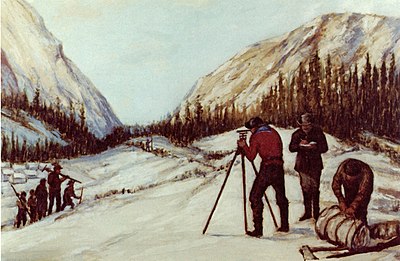
1862—The Mullan Road.
These roads were crude—mere wagon tracks across the prairies or traces chopped through the heavy timber of Florida or Wisconsin—but in the early years of settlement, they were often the only roads the settlers had. Among them were the famous Santa Fe Trail from Kansas City to Santa Fe, New Mexico, marked by the Army, following a route originally beaten by traders and trappers, and Colonel Cooke’s Road from Santa Fe to San Diego, pioneered by the Army in 1846. The Army reopened the 400-mile Old Spanish Trail from Pensacola to St. Augustine, Florida, in 1824–1830. Military roads radiated like the spokes of a wheel from strategic Detroit toward Chicago, Grand Rapids, Saginaw and Cleveland, and in 1838 a 512-mile wagon road was made from Ft. Snelling, Minnesota Territory, to Ft. Leavenworth in Kansas Territory.
One of the most remarkable of the military wagon roads was located and built by Lieutenant John Mullan in 1858 to 1862 from Fort Benton in Dakota Territory, the head of steamboat navigation on the Missouri River, across the Rocky Mountains to Old Fort Walla Walla on the Columbia River. For 20 years afterward, this road was the only way open to emigrants into western Montana and northern Idaho.[1]
In the single year 1866 there passed over the Mullan Road 20,000 persons travelling back and forth, including 2,000 miners stampeding into Montana, 1,500 head of horses, 5,000 head of cattle, 6,000 mules loaded with freight, 83 wagons and $1 million in money.[2]
During the overland migrations of the 1850’s and 1860’s, the Army improved and marked most of the pioneer wagon trails and used them to supply its garrisons. Between 1850 and 1869 some of these trails were transcontinental mail routes used by the Butterfield Overland Mail, the Pony Express, and other mail contractors.
After the Government divested itself of the National Road, military roads were practically the only Federal subsidies to local transportation. These were meager indeed, compared to the largesse that was distributed by Congress to the railroads.
26
